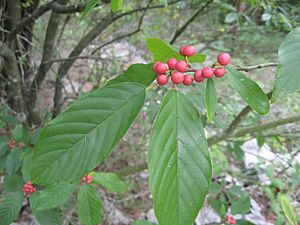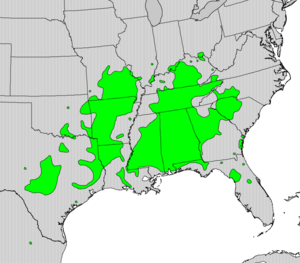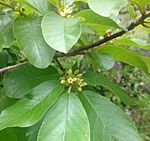Carolina buckthorn facts for kids
Quick facts for kids Carolina buckthorn |
|
|---|---|
 |
|
| Conservation status | |
| Scientific classification | |
| Genus: |
Frangula
|
| Species: |
caroliniana
|
 |
|
| Generalized natural range of Frangula caroliniana | |
| Synonyms | |
|
|
The Frangula caroliniana, often called the Carolina buckthorn, is a cool plant! It's a deciduous shrub or a small tree. This means it loses its leaves every fall. You can find it growing naturally in the southeastern, south-central, and mid-western parts of the United States. Its home stretches from Texas all the way to Florida, and north to states like Maryland, Ohio, Missouri, and Oklahoma. There's even a small group of them living in Nuevo León, Mexico. This plant is super adaptable! It can grow in many different places, like open fields, thick forests, and even on rocky cliffs made of limestone.
Contents
What Does the Carolina Buckthorn Look Like?
The Carolina buckthorn usually grows to be about 12 to 15 feet (3.6 to 4.5 meters) tall. That's about as tall as a small house! If it grows in a shady spot, it can even reach up to 40 feet (12 meters).
Leaves and Flowers
One of the best things about this plant is its leaves. They are shiny and a beautiful dark green color. The flowers are quite small and hard to spot. They are pale yellow-green and shaped like tiny bells. These flowers appear in late spring, right after the leaves have grown. You'll find them tucked where the leaves meet the stem.
Fruits
After the flowers, small, round fruits grow. They are about 1/3 inch (8.3 mm) wide. These fruits are called drupes. When they first appear, they are bright red. But as they get ripe in late summer, they turn black and have juicy flesh inside.
No Thorns Here!
Even though its common name is "buckthorn," the Carolina buckthorn is completely smooth. It doesn't have any thorns at all!
How Animals Use Carolina Buckthorn
The fruits of the Carolina buckthorn are a tasty snack for many animals. Birds, especially songbirds, love to eat them. This plant helps support local wildlife by providing food.
See also
 In Spanish: Rhamnus caroliniana para niños
In Spanish: Rhamnus caroliniana para niños



